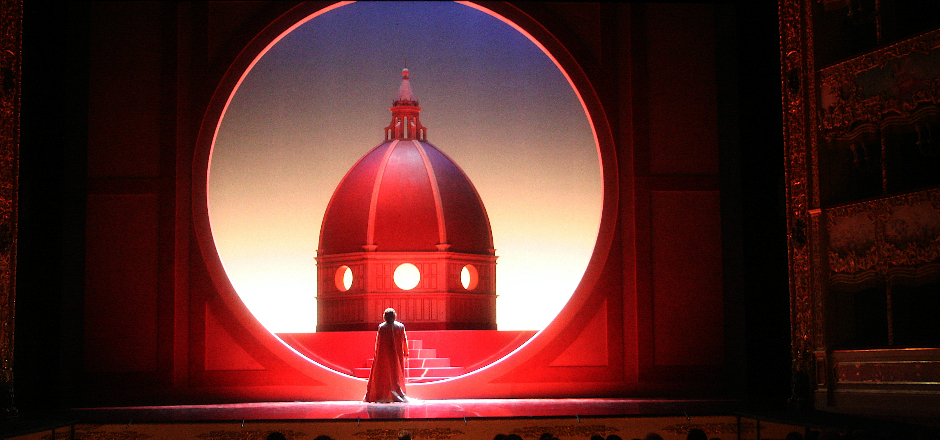Summer season 2017
OperaMusical Extra Event
La Congiura, Firenze 1478
Riz Ortolani
It is the eternal conflict between the passion of youth and the desire for stability of those in power, in an encounter which is neither open nor played out in the light of day, but which uses the hidden back streets of ‘conspiracy’.
It is always the same battle: love, hate, power.
After all, the theme of the “Prince of youth” is inherent in the play, it permeates it throughout, it does not need to be highlighted, and stress is more effectively placed on the elements of mystery and hidden action, elements which can be found in daily life, thus resulting more topical.
It should also be remembered that the great Vittorio Alfieri also used this term in his 'congiura dei pazzi (the Pazzi Conspiracy)
Artists
Riz ortolani
Libretto
Riz Ortolani
Ugo Chiti
Liriche
Lorenzo Raggi
Mae Kroville
Regia e direzione artistica
Sandro Querci
Coreografie
Fabrizio Angelini
Direttore musicale
Roberto Gori
Costumi
Stefano Nicolao
Direzione scenografia e allestimenti
Leonardo Bonechi
Assistenti alla regia
Giuseppe di Falco
Letizia Cirri
Giulia Bonuccelli
Assistente alla coreografia
Daniela Gorella
Luca Maggiore
Franceschino de' Pazzi
Sandro Querci
Giuliano il Principe
Luca Giacomelli Ferrarini
Fioretta
Francesca Colapietro
Cencia
Silvia Querci
Pico della Mirandola
Cristian Ruiz
Fra' Arlotto
Fabrizio Checcacci
Il poeta Pulci
Gabriele de Guglielmo
Jacopo de' Pazzi
Marcopaolo Turci
Lucrezia
Elena Talenti
Clara
Serena Carradori
The plot recalls the story of brazen youth, exhibited in the arrogant matches of Florentine football, horse-riding tournaments, and the passionate love of Giuliano de’ Medici for the very young Fioretta Gorini, the seventeen-year-old daughter of a humble fabric merchant.
At Giuliano’s side is his older and more famous brother: Lorenzo the Magnificent, accompanied by the whole splendid scenario of Medician Florence in its most important moment in history, the Renaissance.
The Conspiracy, plotted over a period of just four months, from January to April 1478, culminated in the assassination of Prince Giuliano in the Cathedral of Santa Maria del Fiore during the Ascension mass on 26 April held by the seventeen-year-old Cardinal Riario, the nephew of Pope Sistux IV.
Franceschino and Bandini go peacefully to pick up Giuliano from Palazzo Medici to make sure of his presence, and they accompany him to the cathedral, taking their places on entering, Bandini to the left of Giuliano and Franceschino to his right.
The silence of the solemn prayer of the faithful is interrupted by the hysterical cry of Franceschino: NOW.
Organised to assassinate the two Medici brothers and destroy the balance of power, the Pazzi Conspiracy is a failure as Lorenzo is miraculously saved by the actions of his friend Nori, who shields him and is killed, having taken the sword that was meant for Lorenzo, while the group of friends manage to hide him in the sacristy.
The Florentines turn against the Pazzi's, brutally massacring them.
This famous passage from history, never represented in theatre until now, allows for the fascinating staging of a restless period, where personal and family intrigue and betrayal intertwine with love, religion, ambition and the hypocrisy of political and diplomatic relations.
A unique blend of important events and strong feelings which were experienced by very young, yet extraordinary, characters in a period of unrepeatable wealth for Italian art and culture: The Renaissance.
COMPOSER’S NOTES
This work took up a lot of my time, most of all in the search for a style with which to construct the entire opera.
I wanted to add a discordant stylistic form into the score as this guided discordance had the potential of providing me with a stronger dramatic force as well as a more intense and interesting sonority.
For example, the first passage, at least in intention, begins as though the sound is rising up from the bowels of the earth, with the vibrant sonority of a light earthquake; it grows together with a number of discordant sonorities, which continue on their musical journey: when the crescendo reaches its peak, a second tonal section comes in to challenge the discordance that preceded it.
It is logical that with this “Florentine football” match (the hunt) - the precursor to modern football (the goal) - I have defined the two teams musically: those in red are the Medici, while those in black, instead, are the Pazzis. The presentation of the game is based on violent percussion which stimulates the two teams in a match characterised by the violence that was, in effect, typical of the time; there are a number of quotes, such as a liturgical theme which I have presented with a grand concerted orchestra piece that introduces a third element: the temporal power of the Church, which looms over the entire story of the Pazzi conspiracy. The full force of Florentine football develops through this liturgical theme.
Among the themes and arias of all of the characters, those which particularly seduced and grasped me were “Amo il mio odio” (Franceschino), powerfully dramatic, “Amante mia” (Lorenzo), his declaration of love made to his city, the duet between the two brothers, Lorenzo and Giuliano, and the final concerted piece for the eight characters with choir and orchestra, pages which are perhaps the most intense, also due to the atmosphere of the opera.
Riz Ortolani

